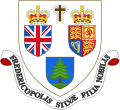A major contributor to this article appears to have a close connection with its subject.(January 2020) |
| Type | Private, for-profit university |
|---|---|
| Established | 2003 |
| Location | |
| Website | www |
 | |
Yorkville University is a private for-profit university established in 2003 with locations in Ontario, British Columbia, and New Brunswick, Canada. [1] The university accepted its first students in the fall of 2004 for the programs offered out of Fredericton, New Brunswick, which was at the time the only establishment under Yorkville University. The university has since launched a brick-and-mortar campus in Vancouver, British Columbia. [2] and acquired 2 brick-and-mortar campuses in Toronto, Ontario. In 2018 Yorkville acquired the RCC Institute of Technology. This included three schools: Academy of Design, School of Engineering Technology & Computing and the Toronto Film School. [3]
